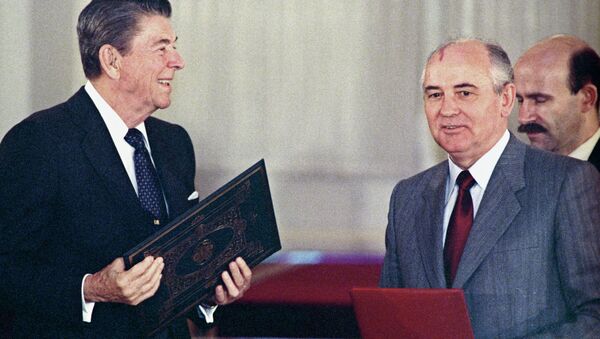“The US, while continuing to insist that Russia adheres to the INF Treaty, should maintain communication on the issue and should exercise patience in waiting for Russia to take measures to reassure Washington of Moscow’s commitment to the INF Treaty,” a Russia expert and author of the book “Russian Foreign Policy toward Missile Defense” Bilyana Lilly told Sputnik on Tuesday.
Lilly said violations of the INF Treaty or a formal withdrawal by either party would be detrimental to the disarmament framework and “disrupt the existing strategic balance of forces.”
The United States contends Russia is in violation of the INF treaty by testing and researching an intermediate range missile, and in July 2014 the US officially brought the issue up with Russia. Russian Foreign Minister Sergei Lavrov has questioned the claims by arguing the United States has failed to provide evidence to validate the accusations.
In late July, the Russian Foreign Ministry published a report pointing to US systems believed to be in violation of the INF Treaty. Those systems include drones, which the Russian Foreign Ministry states have similar characteristics to intermediate-range missiles, and the MK-41 launch systems the US is testing and deploying in Romania and Poland.
“I’d prefer to stick with talking about apples we know, let’s talk about oranges down the road,” Kearn said, referring to drones. While on the deployment of NATO missile defense, Kearn said the US has made it clear that whatever limited posture NATO has in Eastern Europe wouldn’t be useful against Russia’s massive nuclear arsenal.
“We aren’t trying to undermine the deterrent on scientific and technical terms, but that doesn’t sink in. The credibility we might have had is not there and the suspicion that has been created is really hard to break through,” Kearn said.
Kearn argued Russian development of intermediate missiles would be costly and unnecessary given the country’s strategic and long-range nuclear arsenal, while Lilly said intermediate missiles still hold strategic value.
“Possessing and deploying an intermediate range missile close to European territory can enhance Russia’s strategic capabilities vis-à-vis NATO,” Lilly said, adding that Russia’s military doctrine indicated NATO’s enlargement and growing functions as the number one external military threat to its security.
Both experts recommend the United States pursue a cautious approach to respond to Russia’s alleged violations.
Lilly said that while it may be tempting for NATO to strengthen offensive capabilities against Russia in response to INF violations, a “more cautious sit-and-wait approach” would be more advisable.
"Yet, a consistent violation of the INF Treaty by either side in the long-term obviates the need for the treaty’s existence and may force the complying party to engage in the adoption of undesirable, yet necessary, countermeasures to guarantee the preservation of its security and the security of its allies," Lilly said.
The INF Treaty was signed by the US and the Soviet Union in 1988 and banned nuclear and conventional ground-based cruise and ballistic missiles with a range of 310-3417 miles.



